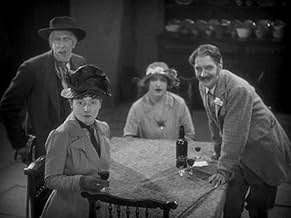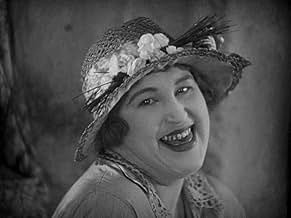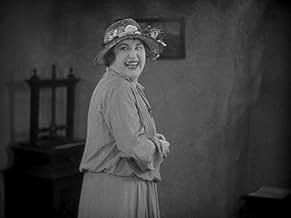AVALIAÇÃO DA IMDb
5,8/10
3,3 mil
SUA AVALIAÇÃO
Adicionar um enredo no seu idiomaAfter his daughter weds, a middle-aged widower with a profitable farm decides to remarry, but he has problems choosing a suitable mate.After his daughter weds, a middle-aged widower with a profitable farm decides to remarry, but he has problems choosing a suitable mate.After his daughter weds, a middle-aged widower with a profitable farm decides to remarry, but he has problems choosing a suitable mate.
- Direção
- Roteiristas
- Artistas
Lillian Hall-Davis
- Araminta Dench - Sweetland's Housekeeper
- (as Lilian Hall-Davis)
Diana Napier
- Sibley Sweetland
- (as Mollie Ellis)
Harry Terry
- Guest at Wedding Breakfast
- (não creditado)
- …
Avaliações em destaque
Slight but enjoyable early Alfred Hitchcock movie about a widower (Jameson Thomas) who sets out to find a new wife with help from his loyal housekeeper (Lillian Hall-Davis). It's a charming and touching story. Not quite what you would expect from the eventual Master of Suspense. It's a good-looking film, as well. Thomas and Davis are both likable. Gordon Harker is fun as the farmer's handyman, Churdles Ash. Love that name. It's nothing to get worked up over but a pleasant enough film that's worth a look to more than just Hitchcock completists.
If you loved Sir Alfred Hitchcock and his contributions and services to the film industry, you should see all of his films for study and preservation. This is one of his early silent films. If you have the patience to watch a two hour silent film, it's not that easy. We're so used to speeches and conversations that we forget to watch and see their facial reactions in the early age of cinema. This film is more comedic than dark and dramatic. While the story is more farcical, it is nice to see Hitchcock have a sense of humor since he became more known for the macabre in his films. It is not hard to believe that film audiences didn't laugh and enjoy this film in the cinema in 1928 long before the Great Depression. Still, I would watch it again if I had too. It's not a bad film. You wouldn't know Hitchcock directed it.
After his wife dies, and their daughter marries, lonely widowed farmer Jameson Thomas (as Samuel Sweetland) decides to look for holy matrimony with another woman. With the help of devoted housekeeper Lillian Hall-Davis (as Minta Dench) and handyman Gordon Harker (as Churdles Ash), Mr. Thomas proposes to three matronly prospects: independent widow Louie Pounds (as Louisa Windeatt), frigid spinster Maud Gill (as Thirza Tapper), and pillowy postmistress Olga Slade (as Mary Hearn). None of the women prove to be satisfactory, but Thomas' ideal mate is closer than he thinks
If "The Farmer's Wife" were filmed a few years earlier, in Hollywood, with Wallace Reid and Norma Shearer, we might have had four decades of romantic Alfred Hitchcock comedies well, maybe not. Anyway, it's a good silent moving picture. The opening sequence, which shows the sad passing of the farmer's wife, is very effective; it's a good change from the original play, considering the silent film medium. But, this film is too long, with the daughter's marriage immediately and unnecessarily dragging the story down; moreover, the ending is drawn out. Mr. Hitchcock's food filming fetish is evident throughout - nobody touches Ms. Gill's gelatin!
****** The Farmer's Wife (3/2/28) Alfred Hitchcock ~ Jameson Thomas, Lillian Hall-Davis, Gordon Harker, Maud Gill
If "The Farmer's Wife" were filmed a few years earlier, in Hollywood, with Wallace Reid and Norma Shearer, we might have had four decades of romantic Alfred Hitchcock comedies well, maybe not. Anyway, it's a good silent moving picture. The opening sequence, which shows the sad passing of the farmer's wife, is very effective; it's a good change from the original play, considering the silent film medium. But, this film is too long, with the daughter's marriage immediately and unnecessarily dragging the story down; moreover, the ending is drawn out. Mr. Hitchcock's food filming fetish is evident throughout - nobody touches Ms. Gill's gelatin!
****** The Farmer's Wife (3/2/28) Alfred Hitchcock ~ Jameson Thomas, Lillian Hall-Davis, Gordon Harker, Maud Gill
This early Hitchcock silent, his first for British International Pictures, is a simple romantic comedy adapted from a stage play. A far cry from crime and suspense, but at this point Hitchcock had neither the influence nor the realisation of his true forte to select his projects.
As with all but one of the Hitchcock silents, the screenplay was by Eliot Stannard. Stannard, with his typical understanding of the visual medium, dispenses with the wordiness of a direct stage-to-screen adaptation. He allows time for the characters to reveal their feelings in reaction shots and point-of-view shots, and replaces verbal gags with visual ones. The Farmer's Wife is thus as devoid of unnecessary intertitles as, say, The Manxman.
Given its rural setting, Hitchcock was more or less obliged to include some shots of rolling hillsides. Hitch doesn't seem to have liked the countryside much – in most of his later films if it appears at all it's as a functional back-projection – but he doesn't do too badly here as far as pure photographic beauty goes. Other than that the shooting style is typical of Hitchcock. There is a growing use of fluid camera movement, and we can see that Hitchcock technique, whereby the camera appears to be leading the audience, gradually revealing to us or drawing us in.
Whether it comes from Stannard's script or Hitchcock's head I don't know, but there is a massive tendency here towards point-of-view shots during dialogue scenes, in which the other speaker looks straight into camera. The majority of these are rather pointless, with the exception of several appropriately ghastly close-ups of the Farmer's bridal candidates.
To say the conclusion of The Farmer's Wife is predictable would be a grand understatement. A shortsighted person could see it coming through several miles of fog. Not a bad thing in itself, but rather than play upon its obviousness (which Stannard and Hitchcock must have been aware of), the picture simply becomes a tedious game of waiting for the inevitable. The Farmer's Wife is only quite funny, and is altogether too long.
As with all but one of the Hitchcock silents, the screenplay was by Eliot Stannard. Stannard, with his typical understanding of the visual medium, dispenses with the wordiness of a direct stage-to-screen adaptation. He allows time for the characters to reveal their feelings in reaction shots and point-of-view shots, and replaces verbal gags with visual ones. The Farmer's Wife is thus as devoid of unnecessary intertitles as, say, The Manxman.
Given its rural setting, Hitchcock was more or less obliged to include some shots of rolling hillsides. Hitch doesn't seem to have liked the countryside much – in most of his later films if it appears at all it's as a functional back-projection – but he doesn't do too badly here as far as pure photographic beauty goes. Other than that the shooting style is typical of Hitchcock. There is a growing use of fluid camera movement, and we can see that Hitchcock technique, whereby the camera appears to be leading the audience, gradually revealing to us or drawing us in.
Whether it comes from Stannard's script or Hitchcock's head I don't know, but there is a massive tendency here towards point-of-view shots during dialogue scenes, in which the other speaker looks straight into camera. The majority of these are rather pointless, with the exception of several appropriately ghastly close-ups of the Farmer's bridal candidates.
To say the conclusion of The Farmer's Wife is predictable would be a grand understatement. A shortsighted person could see it coming through several miles of fog. Not a bad thing in itself, but rather than play upon its obviousness (which Stannard and Hitchcock must have been aware of), the picture simply becomes a tedious game of waiting for the inevitable. The Farmer's Wife is only quite funny, and is altogether too long.
Very funny. I never realized Hitchcock could do slapstick. Surprised to find the story and characters easy to follow and identify with even with the near lack of title cards. The best silent Hitchcock film I have seen and maybe the funniest film he ever made.
Você sabia?
- CuriosidadesUnlike most of his later films, this film does not have a cameo by Sir Alfred Hitchcock.
- Erros de gravaçãoAfter Louisa rejects Farmer Sweetland, his horse changes position it between shots as he mounts it.
- Citações
Farmer Sweetland: ...I am a man that a little child can lead but a regiment of soldiers couldn't drive.
Principais escolhas
Faça login para avaliar e ver a lista de recomendações personalizadas
Detalhes
Bilheteria
- Faturamento bruto mundial
- US$ 152
- Tempo de duração
- 1 h 40 min(100 min)
- Cor
- Mixagem de som
- Proporção
- 1.33 : 1
Contribua para esta página
Sugerir uma alteração ou adicionar conteúdo ausente






















